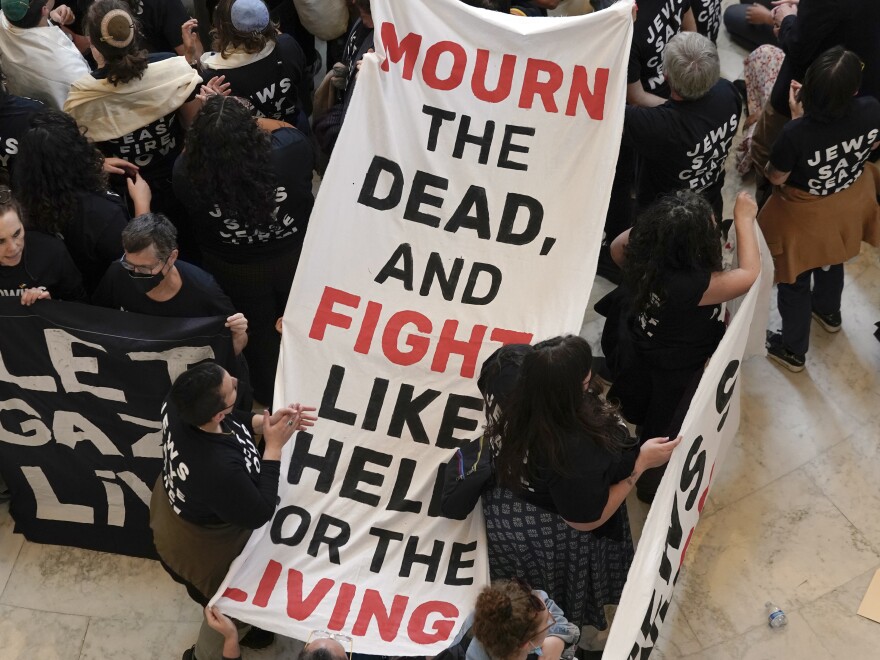Angry protesters shouted pro-Palestinian messages and flew Palestinian flags and in some instances clashed with security in demonstrations from Lebanon to the West Bank and even as far as Washington, D.C.
In Amman, Jordan, more than a thousand people marched toward the Israeli Embassy in the hours after news spread of an explosion at a hospital in Gaza. Security forces tear-gassed people trying to reach the building and riot police managed to push back crowds away from the embassy.
Videos posted online show hundreds of people gathering not far from the U.S. Embassy in Beirut in the second day of demonstrations on Wednesday. Protesters reportedly clashed with police there as well, took down a security wall and cut a fence on the road heading to the embassy.
The anger was sparked after the blast at the Al Ahli Arab hospital in Gaza on Tuesday where hundreds were killed in the explosion. Many called for the end of the attacks on Palestinians in the Gaza Strip. Others expressed anger at what they see is the world turning its back on the Palestinian people.
The raw emotion felt by many hitting the streets in protest in the Middle East, including in Egypt, Morocco and Iran, underscores the spreading tension in the region from the Israel-Hamas conflict.
The U.S. embassy in Beirut issued a warning Wednesday telling U.S. citizens there to avoid the Awkar area "given the potential for further demonstrations." The embassy remained open but the State Department updated its travel advisory for Lebanon to a Level 4: Do Not Travel.

"The Department of State urges U.S. citizens in Lebanon to make plans to depart as soon as possible while commercial options are still available," the agency said.
The clashes continued late Wednesday as President Joe Biden met with Israeli leaders in Tel Aviv. He expressed support for Israel and doubled down on the assertion that the explosion at the hospital was the result of a Palestinian militant group and not an Israel attack. Hamas, the Palestinian group that controls Gaza, and other Arab countries placed the blame on Israel.
Palestinian officials announced a strike on Wednesday in the West Bank in response to the Gaza hospital tragedy. Many stores and businesses were closed as part of this demonstration.
In many neighborhoods in the West Bank, including Ramallah, Nablus and Hebron, Palestinians took to the streets. Some reportedly threw rocks at Israeli security in the West Bank.
Reuters reported that Israeli forces shot two Palestinian teens dead near Ramallah during those protests.
In Washington, organizers had scheduled Wednesday's rally before the blast at the hospital occurred, taking aim at Israel's overall policies in Gaza. An estimated 300 people were arrested during a protest in the Capitol, the U.S. Capitol Police told NPR, and three were charged with assaulting police officers.

American Jewish organizations gathered at the Capitol on Wednesday to criticize the Israeli government's overall policies on Gaza. Protesters demanded an immediate cease-fire of the current violence.
The organizations Jewish Voice for Peace and If Not Now marched in the streets calling for the end of the Israeli bombardment of Gaza. They entered the Capitol building late in the afternoon and continued to hold demonstrations in the Cannon House Office Building until police started to make arrests.
While arrested protesters were being led out of the building – their hands bound by zipties and Capitol police collecting their belongings in plastic bags – they were met with chants of support.
The Capitol Police said Wednesday night that the number of people arrested could change by Thursday once everyone has been processed.
One of the attendees at the Washington protest identified himself as Matthew Hoh, who said he is a member of Veterans for Peace. Hoh said he from North Carolina to attend the rally. He said he was in the wars in Iraq and Afghanistan and he now regrets his involvement.
"For people to say that this (the Oct. 7 Hamas attack in Israel) is another 9/11 and then not to say, 'My God, what have we learned? What will we do? What will come from that?' After everything that we did following 9/11, and the regret and shame that so many of us carry from that," Hoh said.
"If we don't take a stand against it, then when we look back on this and ask how it happened, we will have only ourselves to blame."
Copyright 2023 NPR. To see more, visit https://www.npr.org.






